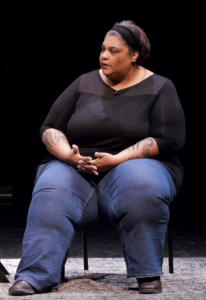
Activists such as Roxana should be listened to, not stigmatised
Obesity campaigns need to switch from ‘fat shaming’ and engage more with ‘fat activists’, public health researchers say.
A culture of conflict and stigma around obesity is evident in Australia and it’s exacerbated by government health campaigns that have oversimplified messages and placed too much emphasis on self responsibility, according to academics at Macquarie University.
In a study, Social marketing and social movements: creating inclusive social change coalitions, they argue that building effective obesity coalitions will require a change of perspective and the use of less stigmatising language.
With around 28% of Australian adults being obese, costing the economy $21bn a year, this a population that we cannot afford to neglect, they say.
“Australian public health actors and government obesity campaigns have so far, failed to engage with or understand fat activists,” says Associate Professor Ross Gordon, a co-researcher on the study from the Macquarie University Department of Marketing.
Referring to examples such as the government’s ‘Measure up’ and ‘Swap it, don’t stop it’ public health campaigns, Gordon says the problem lies in the use of mass media approaches which promote simple messages.
“The issue of obesity and weight is very complex and people find themselves in this position for many reasons. To use simple self help messages of ‘just eat better’ and ‘exercise more’ are just not enough to engage with the right people. Our research with support groups shows that these messages do not support self-acceptance and wellbeing; neither do they actually do much to tackle obesity itself.
Regarding the government’s more recent ‘Girls Make Your Move Campaign,’ Gordon says that “it at least states that it aims to get young women of any ethnicity, size or ability to be more active – so the language seems a bit more inclusive, but again it doesn’t go much beyond a media campaign.
“Fat activists tell us these campaigns still continue to marginalise many, and what they should be doing is striving to build inclusive coalitions with these groups, to look at the bigger picture, form community engagements and interest groups, and to use the correct language that can actually support people in their goals.”
Professor Gordon says it is still early days, and while other efforts to tackle the obesogenic environment such as the sugar tax and a ban on junk food advertising can help, many other countries are still failing to provide hard evidence of successful public health campaigns around obesity.
He likens the job ahead to the global reduction in the use of tobacco, a campaign which employed a successful multi-level stakeholder approach.
“As we know it has been a real long haul 40-50 years in the worldwide reduction of smoking, but through many concerted efforts at various levels of intervention, eg the licensed trade industry, the community, government and marketing policy, persistence has paid off.
“The issues with obesity will need the same degree of multi-level stakeholder intervention for us to see the objectives finally come to fruition.”
Gordon also highlights the challenge of the government policy cycle. “As policy makers, government officials are under pressure to be seen to be doing something to alleviate this issue now.
“What we really need is an obesity coalition within government that is not tied to the individuals who happen to be within the political cycle at the time, but rather people who are in there for the long haul.”